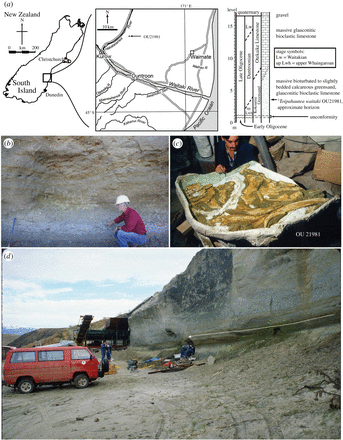@WFS,World Fossil Society,Riffin T Sajeev,Russel T Sajeev
A new archaic baleen whale Toipahautea waitaki (early Late Oligocene, New Zealand) and the origins of crown Mysticeti
- Cheng-Hsiu Tsai, R. Ewan Fordyce. A new archaic baleen whale Toipahautea waitaki (early Late Oligocene, New Zealand) and the origins of crown Mysticeti. Royal Society Open Science, 2018; 5 (4): 172453 DOI: 10.1098/rsos.172453

Geological map, excavation site and initial preparation of †Toipahautea waitaki OU 21981. (a) General map and geological horizon of †Toipahautea waitaki OU 21981; (b) excavation site of †Toipahautea waitaki OU 21981 with RE Fordyce as a scale bar (photo ©CH Tsai); (c) initial preparation of †Toipahautea waitaki OU 21981 by A. Grebneff (photo ©RE Fordyce); (d) scene of excavating †Toipahautea waitaki OU 21981 (photo ©RE Fordyce); the arrow marks the level of the typical basal Duntroonian brachiopod shellbed.
A new genus and species of extinct baleen whale †Toipahautea waitaki (Late Oligocene, New Zealand) is based on a skull and associated bones, from the lower Kokoamu Greensand, about 27.5 Ma (local upper Whaingaroan Stage, early Chattian). The upper jaw includes a thin, elongate and apparently toothless maxilla, with evidence of arterial supply for baleen. Open sutures with the premaxilla suggest a flexible (kinetic) upper jaw. The blowhole is well forward. The mandible is bowed laterally and slightly dorsally; unlike the Eomysticetidae, there are no mandibular alveoli, and the coronoid process is tapered and curved laterally. Jaw structure is consistent with baleen-assisted gulp-feeding. The age of early Chattian makes †Toipahautea a very early, if not the oldest named, toothless and baleen-bearing mysticete, suggesting that the full transition from toothed to baleen-bearing probably occurred in the Early Oligocene. Late Oligocene mysticetes vary considerably in jaw form and kinesis, tooth form and function, and development of baleen, implying a wide range of raptorial, suctorial and filter-feeding behaviour. More study may elucidate the function of jaws, teeth and baleen in terms of opportunist/generalist feeding, as in modern gray whales, versus specialized feeding. We here propose that early mysticetes, when transitioned from toothed to baleen-bearing, were generalists and opportunists instead of specializing in any forms of feeding strategies. In addition, two different phylogenetic analyses placed †Toipahauteaeither in a polytomy including crown Mysticeti, or immediately basal to the crown, and above †Eomysticetidae in both cases. Because the †Toipahautea waitaki holotype is an immature individual, it may plot more basally in phylogeny than its true position.
@WFS,World Fossil Society,Riffin T Sajeev,Russel T Sajeev



 May 2nd, 2018
May 2nd, 2018  Riffin
Riffin  Posted in
Posted in  Tags:
Tags: 